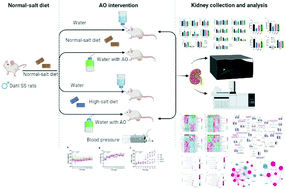Supplementation of amino acids and organic acids prevents the increase in blood pressure induced by high salt in Dahl salt-sensitive rats†
Abstract
A high-salt (HS) diet leads to metabolic disorders in Dahl salt-sensitive (SS) rats, and promotes the development of hypertension. According to the changes in the metabolites of SS rats, a set of combined dietary supplements containing amino acids and organic acids (AO) were designed. The purpose of the present study was to evaluate the effect of AO supplementation on the blood pressure of SS rats after the HS diet and clarify the mechanism of AO by metabolomics and biochemical analyses. The results showed that AO supplementation avoided the elevation of blood pressure induced by the HS diet in SS rats, increased the renal antioxidant enzyme activities (catalase, superoxide dismutase, glutathione reductase, and glutathione S-transferase), reduced the H2O2 and MDA levels, and restored the normal antioxidant status of the serum and kidneys. AO also reversed the decrease in the nitric oxide (NO) levels and NO synthase activity induced by the HS feed, which involved the L-arginine/NO pathway. Metabolomics analysis showed that AO administration increased the levels of amino acids such as cysteine, glycine, hypotaurine, and lysine in the renal medulla and the levels of leucine, isoleucine, and serine in the renal cortex. Of note, lysine, hypotaurine and glycine had higher metabolic centrality in the metabolic correlation network of the renal medulla after AO administration. In conclusion, AO intervention could prevent HS diet-induced hypertension in SS rats by restoring the metabolic homeostasis of the kidneys. Hence, AO has the potential to become a functional food additive to improve salt-sensitive hypertension.



 Please wait while we load your content...
Please wait while we load your content...